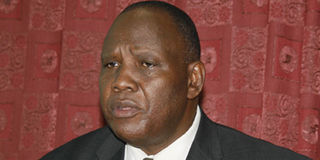Japan firm on the spot in Sh3bn contract

House Committee on Transport, Public Works and Housing members including Walter Nyambati have threatened to blacklist a Japanese firm that won the Sh3 billion consultancy contract on the multibillion Lamu Port project December 15, 2011. FILE
Members of Parliament have threatened to blacklist a Japanese firm that won a consultancy contract on the multi-billion Lamu Port project.
The House Committee on Transport, Public Works and Housing issued the threats to the Japanese Port Consultants, after the latter refused to answer questions citing confidentiality clauses in the contract.
In the end, the MPs warned that should the consultants, who won the Sh3 billion tender, persist with their refusal to divulge the details of the contract, the House would push for its termination and the blacklisting of the firm.
Mr Kehio Nagai, the country co-ordinator for the consultants, on Thursday refused to tell the committee sitting at Continental House, Nairobi, the amount the firm had received for the project so far.
He also did not divulge the contract sum, and neither did he give details on how the tendering was done.
All these, he said, were confidential as per the contract, and could only be divulged after the firm consulted with the government.
“We’re raising issues because Kenyans have asked us about the consultancy at the Lamu Port, but you’ve shown total disregard for Parliament and this committee. You’ve been very uncooperative,” said Mr Isaac Muoki, the Kitui South MP, who chaired Thursday's meeting.
The members of the committee who attended the meeting were Mr Ali Hassan Joho (Kisauni), Mr Walter Nyambati (Kitutu Masaba), Mr Edwin Yinda (Alego Usonga), Mr Benjamin Langat (Ainamoi) and Mr Wilbur Otichillo (Emuhaya).
Tendering irregularities
The furious lawmakers were forced to issue threats that they’d blacklist the consultant from ever carrying out any job in Kenya, given the shady manner in which the procurement of the Lamu Port project was handled.
“The House observed that there were some tendering irregularities in the project. This is Kenyan money, so you cannot cite confidentiality clauses not to tell the taxpayers how much of their taxes is being spent on a public project.”
Mr Nyambati, who was recently reinstated to the committee after he won a by-election, said.
But Mr Nagai’s refrain remained: “I am not willing to hide any information from this committee.”
As a consultant, he said, his client (the Government of Kenya) had not been consulted and so divulging the contract figures and other details on the contract without authority would be a breach of some sections of the contract.
“What I am saying is, you need to give us time to consult with our client and then we’ll get back to you,” Mr Nagai said.
The MPs questioned why the consultant was hesitant and sought to know if he was under instructions from the government not to respond to any of the questions raised.
But Mr Nagai said he had spoken to officials in government about the meeting, but they had not agreed on the form of responses to the committee.
Mr Yinda reminded the consultant that they had a foot in the tender to build a second container terminal in which the government had already guaranteed Sh16 billion from Japan.
“This is money that must be accounted for to the letter. So the next time you come, you must be ready to tell us all the details,” said Mr Yinda.
Price was inflated
The questions on tendering included one in which the government focused on the technical capability of the company, without even looking at the cost and the length of time that the other bidders had submitted.
Although Transport Minister Amos Kimunya in June acknowledged in Parliament that the method was flawed, he maintained that it was the one that had been used, but in future, the government would not use it again.
One of the shocking details in the tender, which the MPs sought explanations, is how a driver in the project can get paid Sh300,000 a week (Sh1.2 million a month).
The MPs think that the price was inflated as people in high government circles angle for kickbacks.




